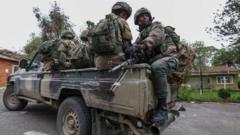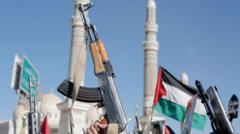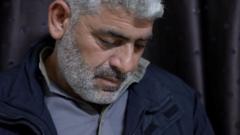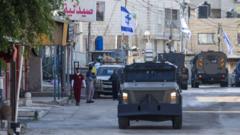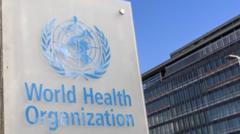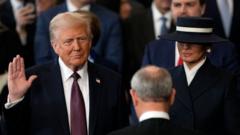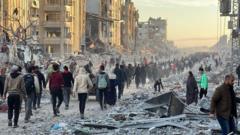**Air strikes in Sanaa resulted in chaos as WHO Director-General Tedros Adhanom Ghebreyesus was present, highlighting escalating tensions in Yemen.**
**UN Chief Caught in Crossfire at Sanaa Airport During Israeli Airstrikes**
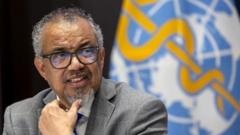
**UN Chief Caught in Crossfire at Sanaa Airport During Israeli Airstrikes**
**WHO's Director General on a Humanitarian Mission Experiences Strikes as 'Barbaric' Attacks Cause Casualties**
UN Health Chief Tedros Adhanom Ghebreyesus was present at Yemen’s Sanaa international airport on Thursday when Israeli air strikes targeted the facility, killing at least six individuals, according to reports. The strikes, which were characterized as “barbaric” by the Iran-backed Houthi forces, occurred as Dr. Ghebreyesus and other UN personnel prepared to depart Yemen after discussions aimed at the release of detained UN staff and assessing the humanitarian crisis.
During the attack, the terminal was filled with chaos, as the Houthi-run Saba news agency reported three fatalities and numerous injuries in the airport area, while another three victims were confirmed in Hodeidah province. The Israeli military asserted that it focused on “intelligence-based strikes on military targets,” emphasizing operations against the Houthi militia, which has been active in the region amidst escalating tensions in the wider Arab-Israeli conflict.
Dr. Tedros reported no injuries but noted significant damage caused to the airport infrastructure, including the air traffic control systems and runway. “We will need to wait for the damage to the airport to be repaired before we can leave,” he stated in a post on X. Meanwhile, UN Secretary General António Guterres expressed deep concern over the recent escalation of violence and its implications for peace in the region.
Following the attacks, the IDF confirmed targeting sites linked to Houthi operations, including power installations and ports, after a statement from Israeli Prime Minister Benjamin Netanyahu underscored his commitment to dismantling the military capabilities of groups aligned with Iran. "We are only just starting with [the Houthis]", he declared.
In the aftermath, reports indicated that a missile launched from Yemen was intercepted by Israeli defenses, further raising alarms in the already volatile situation. Mohammed Ali al-Houthi condemned the strikes, vowing that resistance would persist until the broader conflict with Israel ceases. As the regional conflict escalates, the Houthis have launched missile attacks targeting Israel, leading to an exchange of aggressive military actions.
Iran labeled the strikes as a significant breach of international regulations, heightening tensions across the borders. Such incidents underline the interconnected nature of conflicts in the region, involving several actors and raising the specter of wider confrontations. The Houthis, gaining power in Yemen since 2015, continue to be backed by Iran, marking them as a pivotal force in the Middle Eastern geopolitical landscape.
During the attack, the terminal was filled with chaos, as the Houthi-run Saba news agency reported three fatalities and numerous injuries in the airport area, while another three victims were confirmed in Hodeidah province. The Israeli military asserted that it focused on “intelligence-based strikes on military targets,” emphasizing operations against the Houthi militia, which has been active in the region amidst escalating tensions in the wider Arab-Israeli conflict.
Dr. Tedros reported no injuries but noted significant damage caused to the airport infrastructure, including the air traffic control systems and runway. “We will need to wait for the damage to the airport to be repaired before we can leave,” he stated in a post on X. Meanwhile, UN Secretary General António Guterres expressed deep concern over the recent escalation of violence and its implications for peace in the region.
Following the attacks, the IDF confirmed targeting sites linked to Houthi operations, including power installations and ports, after a statement from Israeli Prime Minister Benjamin Netanyahu underscored his commitment to dismantling the military capabilities of groups aligned with Iran. "We are only just starting with [the Houthis]", he declared.
In the aftermath, reports indicated that a missile launched from Yemen was intercepted by Israeli defenses, further raising alarms in the already volatile situation. Mohammed Ali al-Houthi condemned the strikes, vowing that resistance would persist until the broader conflict with Israel ceases. As the regional conflict escalates, the Houthis have launched missile attacks targeting Israel, leading to an exchange of aggressive military actions.
Iran labeled the strikes as a significant breach of international regulations, heightening tensions across the borders. Such incidents underline the interconnected nature of conflicts in the region, involving several actors and raising the specter of wider confrontations. The Houthis, gaining power in Yemen since 2015, continue to be backed by Iran, marking them as a pivotal force in the Middle Eastern geopolitical landscape.






